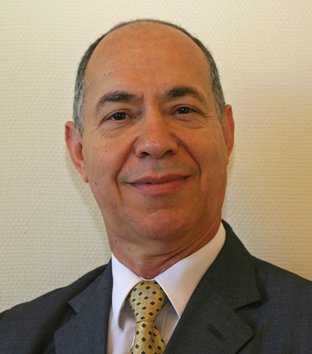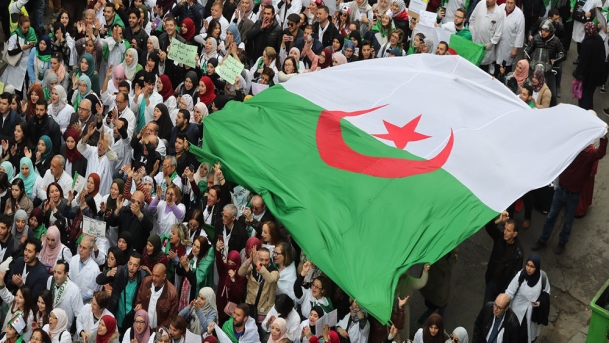
Analyzing an unfolding crisis is always a challenging undertaking, especially when analyzing a country like Algeria whose history is quite complex. However, looking at the origins of the current crisis from a critical, historical perspective can shed at least some light that enables an analyst to decipher the intricacies of State and society and make sense of current unfolding episodes. Such an approach is in fact necessary in understanding the advances and setbacks that Algeria has experienced since independence. Of course, this cannot be done in a detailed fashion due to space limitations.
Therefore, this paper will provide first a cursory perspective on the period that preceded the current crisis. It will then assess the twenty-year rule of Abdelaziz Bouteflika and analyze the reasons that triggered the massive demonstrations since February 2019. The paper will also analyze the demands/grievances of the millions of the protestors and how they articulated those demands, which matured in response to the actions of the fragile government and the decisions of the military’s strongman, Ahmed Gaïd Salah (aka AGS). The conclusion of the paper will focus on the issues regarding the prospects for a peaceful transition.
A Stolen Revolution
It is no secret that the conception of the Algerian political system, whose dismantling protestors are calling for, has been conceived prior to independence in 1962. The foundation of the Algerian system was, since the country’s independence in 1962, authoritarian; it reflected the nationalist movement’s narrow vision which made independence its exclusive slogan, thus failing to produce a social program for the post-independence era. Due to the specific nature of the nationalist movement, the Front de Libération Nationale (FLN), whose claim to authority rested solely on historic rather than democratic legitimacy, was proclaimed in 1963 the only lawful party.
In this system, however, the FLN, officially entrusted with the task of controlling civil society, remained a mere transmission belt to the clan or clans in power. In fact, the party was simply an instrument of control and repression in the hands of the ruling bloc. Because the regime lacked popular legitimacy and was suspicious of the masses, an entire administrative and political machinery was instituted to generate unanimous approval of its policies. The regime sought to exert complete domination over every aspect of state and society, for it needed to remain in power whatever the means.
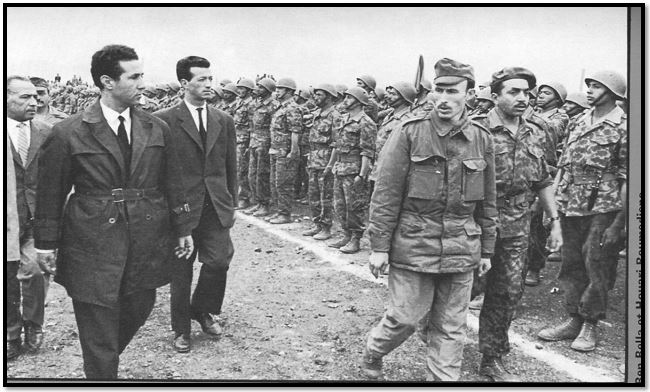 |
| President Benbella and Colonel Boumediene [World Press] |
The bloc in power (le pouvoir) was not only distrustful of institutions but was also apprehensive of other rival clans, as well as society. However, despite the clan’s totalitarian attempts, concurrent mechanisms (e.g., development of an informal sector—in which some dignitaries of the regime were and still are involved—dissidence in the guise of cultural demands, such as Islamism, Berberism, etc.) challenged overtly and covertly the regime's policies. A polarization between state and civil society was the most perceptible corollary of the policies various regimes have pursued. The institutions put in place have rarely represented the real interests of society.
Rather, their real function was to provide the illusion of legitimacy and to prolong the power of the incumbent regime of the nascent local oligarchy whose interests, linked to their patrons in the regime, were opposed to the masses. The power in place empowered clienteles within these institutions because of the factionalism that has pervaded the system. Corruption, clientelism, nepotism and favoritism best characterize the system, which has also permeated society.
Undoubtedly, the political system instituted since independence has had a long-lasting, detrimental, influence on the transition to a more democratic state and society. The regime’s legitimacy of its continued rule drew from the war of liberation (which has been eroded by the late 1980s), but also from the hydrocarbons revenues. Algeria is a rentier state that has resisted making genuine economic reforms; the rent helps ensuring both social and political peace. This explains why upheavals usually follow the drop in the oil prices when the regime can no longer keep its bargain of the social contract or rather a ‘rentier social pact’ (1) that ties it to society, i.e., the redistribution of part of the rent to the population and to the clienteles.
Although the popular masses experienced substantial improvement in their standards of living, due to the large revenues from hydrocarbon earnings and an initially successful industrialization program (mainly in the 1970s), the existing gap between the masses and the rich class, led to recurrent social discontent. The non-existence of democratic mechanisms constrained Algerians to adopt attitudes of apathy toward the regime and its populist discourse, thus strengthening the growing suspicions vis-à-vis the state and to totally distrust the élites in power. The prevalent expression of this general dissatisfaction came in the form of passive resistance: complete apathy toward public affairs, strikes, riots, absenteeism, lack of civism, disrespect for state symbols, brain-drain, and illegal and legal migration of the youth.
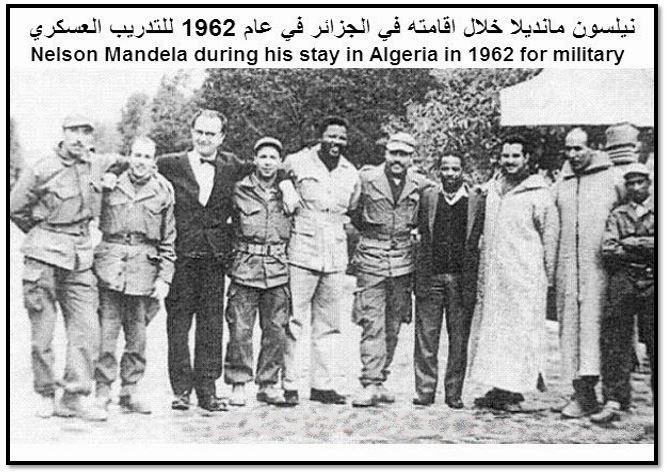 |
| Mandelia in Algeria [MEI] |
The Missed Opportunities of Negotiated Pact Transition
Prior to Bouteflika’s rule (1999-2019), Algeria had missed two opportunities for a transition to a democratic system, or at least a system based on good governance, rule of law and political participation. The first was in 1976 when the regime had, despite its shortcomings, enormous positive achievements, especially in the socio-economic realm and when it elaborated a Charter following democratic public debates. Unfortunately, the regime reverted to authoritarianism soon thereafter.
The second, more opportune, occurred after the 1988 bloody riots. The rioters had called for the ejection of all officials whom they believed had betrayed the promises of the struggle for independence. They also called for justice, the end of the hogra (bullying), and for the respect of their dignity and the enjoyment of full citizenship. (2)The liberalization process that ensued, under what one may term the “reformers” was quite promising.(3) That transition, however, failed because the actors did not arrange for a negotiated pact, which would have clearly delineated the roles of the government or of the opposition parties, which had been legalized following the riots, and the military.
A negotiated pact, as transitologists theorized in the 1980s,(4) would have made such transition possible, perhaps one unique in the Arab world. The absence of such a pact in Algeria before the fateful elections of 1990 and 1991, which saw the overwhelming victories of the illegally authorized Islamic Salvation Front (FIS), was one of the primary reasons for the military’s intervention in January 1992 and the civil strife that followed. Many military or military-backed governments in Latin America, faced with severe economic difficulties (brought on in part by their own economic mismanagement) wished to leave power on their own terms. They installed “tutelary” democracies, which protected their prerogatives while allowing them to disengage from direct involvement in political affairs.
That process inaugurated a process of liberalization and even democratization. One can make the argument that Algeria could have followed a similar process.(5)Unfortunately, the strategy the regime pursued after the October events consisted of ousting a few of the most detested public figures. The regime resorted to the familiar stratagem: while the whole political system was de-legitimized, the regime sacrificed a few figures (the secretary-general of the FLN and the head of intelligence services), but the regime remained intact, the push of the reformers notwithstanding.
While the Mouloud Hamrouche reformist government sought genuine reforms, these reforms remained cosmetic because the regime obeyed the same logic: how to remain in power. Besides, the reforms were not thought out through a democratic, consultative debate; the few that the conservatives (duros in the Latin American case) conceded were forced upon the regime by the “street” and the tenacity of the reformers.
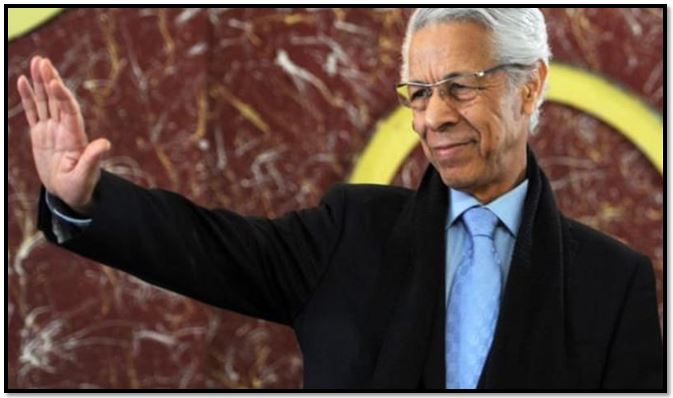 |
| Mouloud Hamrouche [Aljazeera] |
The pouvoir (deep state) foremost objective in allowing them was to thwart further outbreaks from happening. Therefore, they remained rather fragile. More importantly, there was no search for a pact with the burgeoning civil society.(6) The reforms, from above, were part and parcel of the power struggle inside the regime and were launched, therefore, to help the perpetuation of the system.
In sum, the changes could not result in the institutionalization of a genuinely democratic state, but simply to preserve the old one by giving it a ‘democratic’ façade. In other words, the regime used the multiparty system put in place since 1989 as an instrument of preservation and an astute way of controlling any opposition. Interestingly, both the FLN conservatives and the FIS obtained the downfall of the Hamrouche reformist government.(7) The Islamist radicalism and the explosion of terrorist violence gave the regime the opportunity to reverse the progress made in 1989-1991.(8)
The five years following the cancellation of the electoral process in 1992 were marked by political violence. In order to break the deadlock of violence, from the end of 1995 onward, the rulers, implemented institutional normalization (e.g., new Constitution in 1996, legislative elections in 1997…). The regime oscillated between authoritarianism and fragile forms of democracy. The transition period, in which Algeria engaged in, was extended indefinitely; it had become a protracted transition with no end in sight.
The Algerian political system has thus been neither democratic nor authoritarian in the strict definition of the concept. Like many other regimes in the region, it corresponds to the hybrid types with different appellations, such as competitive, electoral, hegemonic or semi authoritarian, although under Bouteflika’s rule the system reintroduced many characteristics of classical authoritarianism.
The Reign of Bouteflika: The Hyper-Personalization of Power
Although he was credited with reestablishing peace in the country, through the Civil Concord soon after his questionable election in April 1999 (9) and the Charter on National Reconciliation in 2005, it was in reality his predecessor Liamine Zeroual, who had begun the Rahma policy (1994) whose objective was for the Islamist fighters to lay down their arms in return for amnesty. In addition to the reinstatement of revolutionary legitimacy and the redistribution of the hydrocarbons revenues, restoration of peace and security served as the main sources of legitimacy of the Bouteflika regime.
Bouteflika was not content to serve two terms in office as inscribed in the 1996 constitution and a genuine transition to genuine democratic governance was not part of his agenda.(10) Being confident about his “achievements,” during his first and part of his second terms, Bouteflika introduced in 2008 amendments to the 1996 Constitution, adopted overwhelmingly by parliament, which removed the limit on the number of presidential terms, thus making Bouteflika a president for life.(11)
As both commander in chief of the armed forces and defense minister, Bouteflika gradually forced into retirement senior officers with officers loyal to him and succeeded in reducing the military’s political role. His reelection in 2004 confirmed that he had, at least in appearance, succeeded in prevailing over the military and greatly reducing their role in politics. Unquestionably, overtime, the armed forces had become more professional and benefited from modernization of their equipment obtained thanks to a substantial budget. But, while he established his seeming power over the military, he did not fully control the intelligence services,(12) although he managed to remove in late 2015 powerful Major-General Mohamed Médiene, alias “Toufik,” who had headed the Directorate of Security and Intelligence (DRS) for 25 years.
Bouteflika ruled Algeria virtually unrestrained. From a conceptual perspective, his rule fell within the definition of neo-sultanistic regimes, that is, neopatrimonial regime marked by personal rulership. Indeed, Bouteflika used his power without restraint, at his own discretion and above all uninhibited by rules or by any dedication to an ideology or value system. He surrounded himself largely with people he had chosen directly; these people were mainly members of his family, individuals from his (western) region, friends, business associates, or individuals who ensured that that the regime sustained itself. The position of Bouteflika’s entourage grew from their total personal submission to his person. Government officials acted as the personal servants of Bouteflika despite his incapacity to oversee government affairs, and they obtained their power solely from this relationship with Bouteflika.(13)
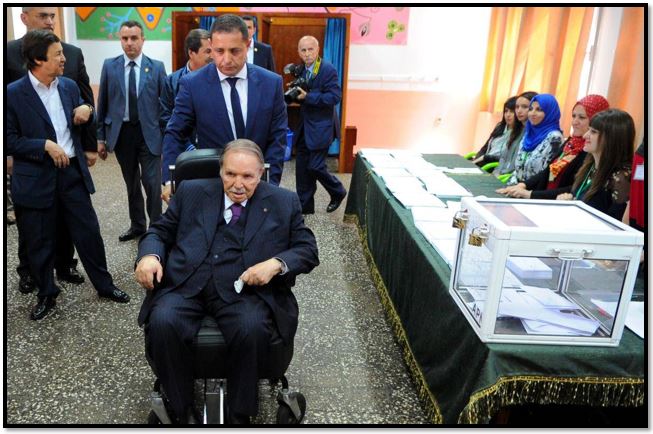 |
| Former President Abdelaziz Bouteflika [Getty] |
The absence of rule of law and utter corruption were the hallmark of Bouteflika’s regime. Bouteflika generally used the parliament as a rubber stamp for his policies. Still, to ensure support for the constitutional revisions and for his candidacy for a third term (2009-2014), for instance, parliamentary deputies—and later governors and high government officials—received a 300 percent salary increase two months prior to the election, even though their salaries and benefits were already considerable compared to those of the average citizen.
Opposition political parties—secular and religious—exist, but they have shown no proclivity for acceding to power. They were content with having representatives in the parliament in part because a portion of their salaries went to the parties’ coffers. This explains why the population did not see the political parties as playing a consequential role in politics or their power to produce any change; the low turnout for the May 2012 and 2017 legislative elections and the 2014 presidential election confirmed this pessimism toward the political system and its capacity to effect far-reaching transformation.
Furthermore, Bouteflika sought to tame civil society and tolerated only those associations that supported him. Worse still, he ensured that he would remain president for life, although in 2016 an amendment to the Constitution reinstituted the two-term limit, which did not affect him. Bouteflika created a real vacuum around him and eliminated any genuine opposition to his rule. The political parties were atomized to prevent them from ever forming a mass party like the Islamic Salvation Front, which was the first ever force to challenge the existence of the regime.(14)
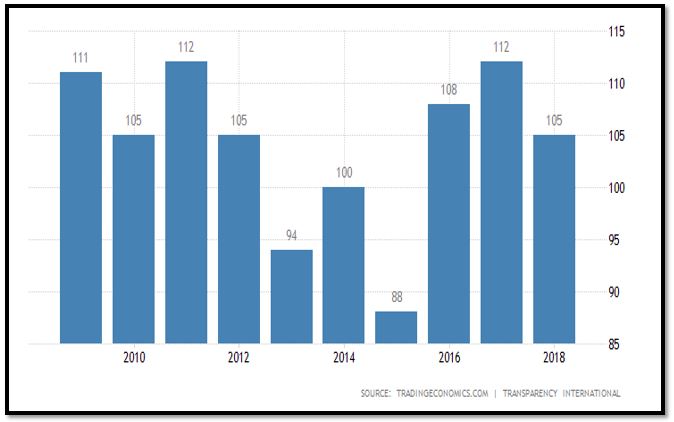 |
| Algeria Corruption Rank in 2019 [Transparency International] |
Algerians opposed resistance to the regime(15) through independent unions or through dissensions within the regime itself, as well as through limited riots or by low participation at the polls during elections; yet, Bouteflika and his cronies were convinced that Algerians can be coopted through a redistribution of the oil revenues (cheap housing, food subsidies…). Bouteflikists still believed this scenario even when the economy was at a standstill.
While analysts had become aware of the explosive situation,(16) and despite warnings, the regime did not anticipate the massive demonstrations that have challenged the regime since February 2019. Officials were convinced that since Algeria was able to elude the so-called “Arab Spring”(17) they would be able to overcome the economic crisis and contain any wave of protests (about 500 riots a month). In fact, officials were persuaded that Algerians had become apathetic and would thus not venture into massive protests.
In fact, the regime persisted in reminding the population that any mass upheaval would result in a situation like Libya, Syria or Yemen, forgetting that more than 70 percent of Algeria’s population is below 35 years old and that most of them have not experienced the bloody decade of the 1990s.
End of Bouteflikism or End of the Regime?
As is expected in an oil rentier economy, the drop in the prices most of the time results in hardship for the population, especially the middle class and the poor. The regime’s unwillingness all these years to transform a rentier economy into a productive one has come back to haunt it in exactly the way experts had predicted. The government had no other choice but to cut budgets, increase the prices of some goods, and reduce imports. The challenges were made even worse by other factors, particularly corruption. Indeed, Transparency International’s Corruption Perceptions Index 2018 ranks Algeria in 108th place out of 180 countries, and the World Bank’s Doing Business 2016 puts Algeria at 163 out of 189.
Corruption scandals had become widespread, resulting in heavy losses for the country’s economy, while infuriating the citizens. Bouteflika failed in transforming the rentier economy into a productive economy or diversifying it, maintaining Algeria as a one-commodity producer (hydrocarbons)—revenue from hydrocarbons account for about 60 percent of Algeria’s GDP and 97 percent of foreign earnings. The regime resorted to the printing of money to survive the economic crisis, but this did not alleviate the impoverishment of Algerians. Regardless, officials continued to claim that under Bouteflika Algeria has been a beacon of stability and that the program of austerity put in place would help overcome the crisis.
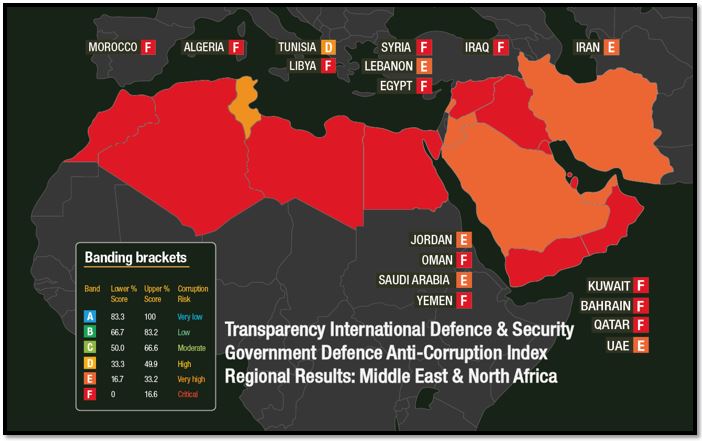 |
| The fight against corruption [Transparency International] |
How does one account for the demonstrations? The contention here is that Bouteflika seeking a fifth mandate was only the trigger; however, Algerians had cumulated grievances against the kleptocratic regime whose corruption had attained staggering proportions for years. Already in 2014, Algerians were opposed to Bouteflika’s running the country. Despite his poor health (he suffered a stroke in April 2013), Bouteflika was re-elected for a fourth term in April 2014, campaigning through proxies since he could not walk or give speeches (his last speech to the nation was on 8 May 2012!).
Bouteflika’s reelection for a fourth mandate was clearly inflated; the alleged 51,7 percent rate of participation was much higher than it really was; most observers contended that it did not surpass 30 percent. During the fourth term, the prospects of Bouteflika, whose health had deteriorated considerably—he moves on a wheelchair and seems unaware of his surroundings—seeking yet a fifth mandate in 2019, was a perspective that shamed the regime and embarrassed the population.
Those who have benefited from his rule wished that he would run for a fifth mandate despite calls in 2018 from many quarters that he should not. Through his powerful brother and advisor Saïd Bouteflika and a constellation of cronies, including bureaucrats, government party members (FLN, RND, Taj, and MPA), senior military officers, the government workers’ union (UGTA, all part of the so-called presidential clan that ran the country, Bouteflika declared on 10 February that he would be candidate for a fifth term in violation of the constitution and his deplorable health condition.
Opposition to his candidacy did not derive from his violation of the constitution but mainly from the humiliation Algerians had been feeling throughout his fourth term. It would be a grave mistake to underestimate this element in decoding the demonstrations that began in Bordj Bou Arreridj on 13 February (with the slogan “Makach ouhda khamsa,” “no 5th term”), then in Kherrata and Khenchela on 16 February 2019 (with the call “no to the 5th term of shame”) before taking on a national dimension by the millions. In the Algerian psyche, this kind of humiliation or assault on their dignity (as was the case under colonialism) have always triggered rebellions, though the timing is often unexpected as was the case of Berber Spring in April 1980 or the October Riots in 1988, which had been preceded by limited demonstrations in 1986.
In the social media, Algerian were highly critical of the president’s appalling rare appearance. Algerians were infuriated seeing officials offering a picture to the Bouteflika’s frame. The indignant behavior of his cronies nauseated Algerians who understood nonetheless that such insistence in keeping Bouteflika in power derived from the predation they were enjoying (access to contracts, high pay, and other privileges). Algerians felt that they had become the laughing stock of the world.
 |
| Protest slogans [Africanews] [Unspecifeid] |
The massive protests on February 22 and afterwards were striking by their peacefulness; the role of social media was considerable in passing the message of nonviolence. Obviously, the presidency would have preferred violent riots, so that violence could force the military to intervene and impose a state of emergency. This proved to be a serious miscalculation on the presidential clan for two main reasons: 1) the military had made it crystal clear that it would not intervene, suggesting that the military institution had decided to abandon Bouteflika’s regime; 2)the millions of demonstrators decided to conduct the demonstrations peacefully (“silmiya”), denying any justification for the security services to use force.
In fact, the most stunning development was the advent of a powerful civil society, with incredible organizational, nonviolent skills. No less amazing was the progressive politicization of the movement. The determination of the regime to maintain the election strengthened the determination of the protesters to oppose the possibility of a fifth term for Bouteflika. Fissures within the regime multiplied; even state employees began denouncing the regime. More importantly, the Armed Forces showed signs of impatience with the Bouteflika clan. The head of the military Ahmed Gaïd Salah even raised the specter of Art. 28 of the Constitution part of which stipulates that, “[the National People’s Army] shall also assume the task of protecting the unity of the country and the integrity of its land…”(18)
One could only infer from this that the stubbornness of the president not to resign constituted a threat to the country’s national security and therefore even his entourage would be held accountable. Although Gaïd Salah had been one of Bouteflika’s main supporters, he had now changed his position, claiming to be siding with the protesters who had kept the pressure to prevent a fifth term for Bouteflika. In fact, without this pressure and Gaïd’s change of position, which no doubt was the result of consensus inside the military command to see Bouteflika forsake his candidacy of a fifth term, Bouteflika would have clung to power indefinitely since his cronies had so many interests at stake. On March 26, Gaïd Salah called for the application of Article 102 (19) of the Constitution to force Bouteflika to leave his post. The next day, the parties of the so-called Presidential Alliance, such as the FLN and RND, supported this call, hence confirming the fractures inside the regime. On 2 April, under unbearable pressure from the military, Bouteflika announced his resignation.
Since the situation in Algeria is constantly evolving, Algeria scholars are better advised to focus on the analysis rather than day-to-day events that the media report regularly.
The preliminary conclusions that one can draw from the recent events is that Algerians are no longer content with Bouteflika’s resignation, even if that represented a first victory and empowered the movement. They insist that the system needs to be transformed and all the principal figures that served the system must also be removed (“Tetnahaw ga’a,” “you must all go”). They have singled out all those figures, some of whom have already been removed or are being arrested (heads of Wilayat have been removed on 22 April). Algerians have rejected all the government’s subterfuges aimed at keeping the system in place.
This explains why the demonstrators have maintained the same momentum as on February 22, which saw millions march throughout the country. Although Gaïd had enjoyed some of their support, voices are calling for his departure because he was linked intimately to Bouteflika. The ANP remains quite popular in Algeria; however, the demonstrators have made clear that they reject a military regime. They aspire to a democratic, republican state, one where transparency and accountability are norms. There is something striking about the social movement beyond the awakening of civil society that was thought to have vanished.
The most important has been the waking of the revolutionary figures of the war of independence. Djamila Bouhired, a hero of the battle of Algiers and a critic of the regime has marched with the demonstrators who showed an incredible support to her person and what she represents for Algerian history. Not just Bouhired. Demonstrators carried the portraits of Larbi Ben Mhidi, Mostefa Benboulaid, Cl. Amirouche and many others. In lieu of the picture frame that had serve to mock Bouteflika, they carried the pictures of the national heroes, martyrs of the war of independence. The message was clear: the regime has stolen the revolution and true legitimacy rests with those heroes not with the incumbent regime.
This marks the definitive end of the revolutionary legitimacy that successive regimes have claimed since independence. It is this bonding between the demonstrators with the revolutionaries that has delegitimized totally the regime and explains calls for a “second republic;” this also suggests that they view the current system as the heir of the colonial state.(20) This bonding between the war heroes and the new generation means that the latter is also willing to rise, albeit peacefully, against an oppressive regime as was the colonial state. This has been the attachment of Algerian to a common, glorious past. This strong unity of Algerians, who have put aside their ethnic, regional, or ideological differences, which the regime had used to its own purposes in the past, is reviving values that were buried for decades, especially under Bouteflika’s rule.
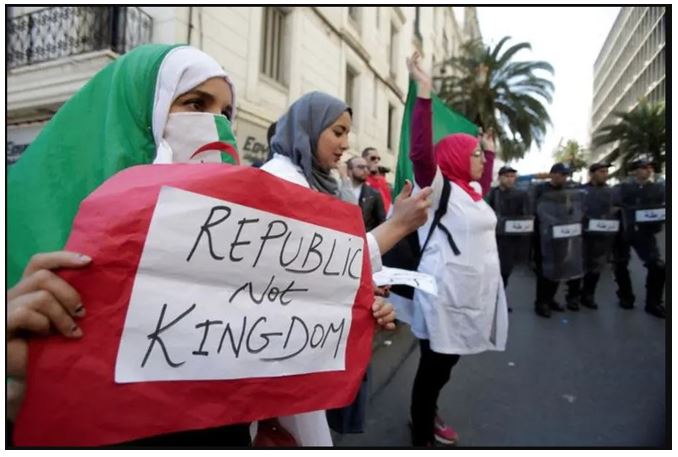 |
| Women in Algeria protests [Getty] |
The large participation of women has also been a major part of the movement. Another remarkable feature of this hirak has been the relegation of the Islamists, who have made even a timid attempt to hijack the protests as they did successfully in 1988 because the protesters showed no interest in Islamist ideology. They are opposed to foreign interference and have warned the West, particularly the former colonial power, France, and other states from interfering in their movement. Truly, the Algerian hirak is quite reminiscent of Algerians’ celebration of independence on 5 July 1962 and afterwards. It indicates that there is genuine determination to founding a second, democratic republic.
Conclusion
The peaceful revolution marks an extraordinary turning point in Algeria’s post-independent history. Algerians have sapped the hybrid, yet robust, authoritarian regime that had wounded their dignity and defamed the reputation of their nation. They are now fighting for a genuinely democratic republic. However, today, the most important challenge is to keep the momentum unrelenting in the movement’s demands and to begin addressing the difficult questions of the transition to this second republic. Protesters have made radical demands but, like most successful transitions have shown, they still need to dialogue with some members of the old regime, that is, those that have simply served the state and did not engage in corrupt practices.
Debates are being held in universities—which had lost their role of centers of knowledge and ideas in the last twenty years—and among some respected national figures to work out transition strategies. Since one of the pillars of the system has been the military, the main question is what role the military will play during this transition. Some Algerian intellectuals are convinced that the “ANP is determined not to supervise, control or supervise the profound social change that Algerians are undergoing (because that is not its role) but to guarantee its effectiveness and success.”(21) Should Algeria succeed in this transition, it would certainly disprove the transitologists who have focused on the so-called “Arab exceptionalism.”(22) For the moment, this seems to be the case. But, undoubtedly, Algerians will certainly have to prevent the old regime from stealing the revolution as it did after 1988.
(1) N. Safir (2019, April 3) ‘Algérie 2019: une crise majeure.’ Diploweb.com : La Revue géopolitique. 3 April 2019. https://www.diploweb.com/Algerie-2019-une-crise-majeure.html. This article explains convincingly how the two pillars of the regime’s legitimacy eroded and eventually triggered the protests that began in February 2019.
(2) See, Y. H. Zoubir (1996) ‘The Failure of Authoritarian Developmentalist Regimes and the Emergence of Radical Protest Movements in the Middle East and Africa: The Case of Algeria, Journal of Third World Studies, Vol. 13, No. 1, Spring 1996, pp. 127-184
(3) Subsequent to the introduction of the new Law on Political Associations, numerous parties were either newly formed or emerged from clandestine life (e.g., PAGS, PST, FFS, MDA, MDRA, etc.) or were proclaimed after long years of struggle against the succeeding FLN regimes (e.g., RCD, FIS). In addition.
(4) G. O’Donnell and P. Schmitter (1986) Transitions from Authoritarian Rule-Tentative Conclusions about Uncertain Democracies (Baltimore: The Johns Hopkins University Press), p. 40.
(5) Y. H. Zoubir and R. Nelson. (1997) ‘Transitions from Authoritarianism to Democracy: Brazil and Algeria in Comparative Perspective,’ Paper presented at the Middle East Studies Association Annual Conference, San Francisco, California).
(6) Y. Zoubir (1999) ‘State and Civil Society in Algeria,’ In Y. H. Zoubir, Editor, North Africa in Transition: State, Society, and Economic Transformation in the 1990s, Gainesville, FL: University Press of Florida), pp. 29-42.
(7) L. Dris-Aït-Hamadouche and Y. H. Zoubir (2009) ‘Pouvoir et opposition en Algérie:Vers une transition prolongée,”L’Année du Maghreb 2009 (Paris: CNRS, November), pp. 111-127.
(8) Reformist prime minister Mouloud Hamrouche embarked on a policy of political and economic liberalization: he pushed for the adoption of a law on money and credit, which is central to the management of the economy and tried to end administered exchange rates (e.g., devaluation of the dinar). In the agricultural sector, the major socialist domains were gradually privatized, and a large part of the nationalized land was returned to its former owners. He also sought to integrate the economy into the world economy.
(9) The military imposed him as the candidate; aware of the maneuver, the six presidential contenders withdrew on the eve of the election. On the political front, he authorized the private press and opened the public media. For the first time, television hosted rich, free, and contradictory political debates.
(10) Y. Zoubir (2000) ‘Algerian Democratic Transition under Bouteflika’s Rule: One Step Forward or Two Steps Back?’, Civil Society (Cairo, Egypt), Vol. 9 (101), pp. 4-9.
(11) For an analysis of the changes, see, A. Aghrout and Y. H. Zoubir. (2009) ‘Introducing Algeria’s President for Life,’ Middle East Report Online: http://www.merip.org/mero/mero040109.html.
(12) H. Roberts (2007) ‘Demilitarizing Algeria,’ Carnegie Paper no. 86 (Washington, D.C.: Carnegie Endowment for International Peace, May 2007), p. 15. https://carnegieendowment.org/files/cp_86_final1.pdf
(13) This analysis reflects the work, Sultanistic Regimes (1998). Edited by H.E. Chehabi and J. J. Linz (MD: Johns Hopkins University Press).
(14) Y. H. Zoubir and A. Aghrout (2012) ‘Algeria’s Path to Political Reforms: Authentic Change?” Middle East Policy, Vol. 19, No. 2, Summer 2012, pp. 66-83.
(15) Y. H. Zoubir and L. Dris-Aït Hamadouche (2018) ‘Algérie : résistances et contre-résistances,’ In. Alternatives Sud. État des luttes-Moyen-Orient et Afrique du Nord : Points de vue du Sud. Vol. 25, 4, pp. 109-116.
(16) Y. Zoubir (2016) Algeria after the Arab Spring,” Foreign Affairs, February 2016, https://www.foreignaffairs.com/articles/algeria/2016-02-09/algeria-after-arab-spring
(17) Y. H. Zoubir (2011, 20 October) ‘Arab Spring: Is Algeria the Exception’ EuroMeSCo-IEMed Policy Brief, No. 17, https://www.euromesco.net/publication/the-arab-spring-is-algeria-the-exception/
(18) The Constitution of the People’s Democratic Republic of Algeria-Edition 2016. http://www.conseil-constitutionnel.dz/pdf/Constitutioneng.pdf
(19) Art. 102 stipulates that, “When the President of the Republic, because of a serious and lasting illness, is totally unable to perform his functions, the Constitutional Council shall meet de jure and, after having verified the reality of the impediment by all appropriate means, it shall propose, unanimously, to Parliament to declare the state of impediment.”
(20) Tlemçani, R. (April 2019, 9 April). ‘Algeria: Inventing New Political Rules.’ Arab Reform Initiative. https://www.arab-reform.net/publication/algeria-inventing-new-political-rules/
(21) Mebroukine A. (2019, 17 April). ‘L’Armée accompagnera le changement voulu par les Algériens’ Le Matin d’Algérie. https://www.lematindalgerie.com/larmee-accompagnera-le-changement-voulu-par-les-algeriens
(22) A. Stepan and G. Robertson, (2005) ‘Arab, not Muslim Exceptionalism’, The Journal of Democracy, vol. 15, n. 4, pp. 140-6; S. Lakoff (2005) ‘The Reality of Muslim Exceptionalism’ The Journal of Democracy, Vol. 15, n. 4, pp. 133-9; I. Harik (2006) ‘Democracy, ‘Arab Exceptionalism,’ and Social Science,’ The Middle East Journal, Vol. 60, n. 4, pp. 664-84; A.A. Goldsmith (2007) ‘Muslim Exceptionalism? Measuring the “Democracy Gap,”’ Middle East Policy, Vol. 14, n. 3, pp. 86-96.
